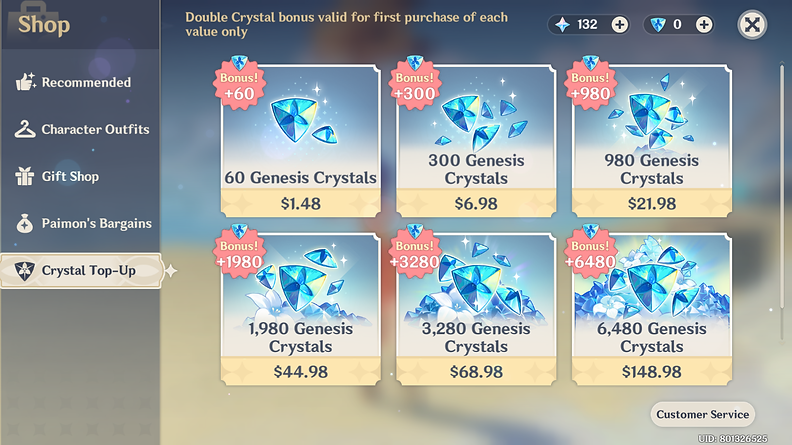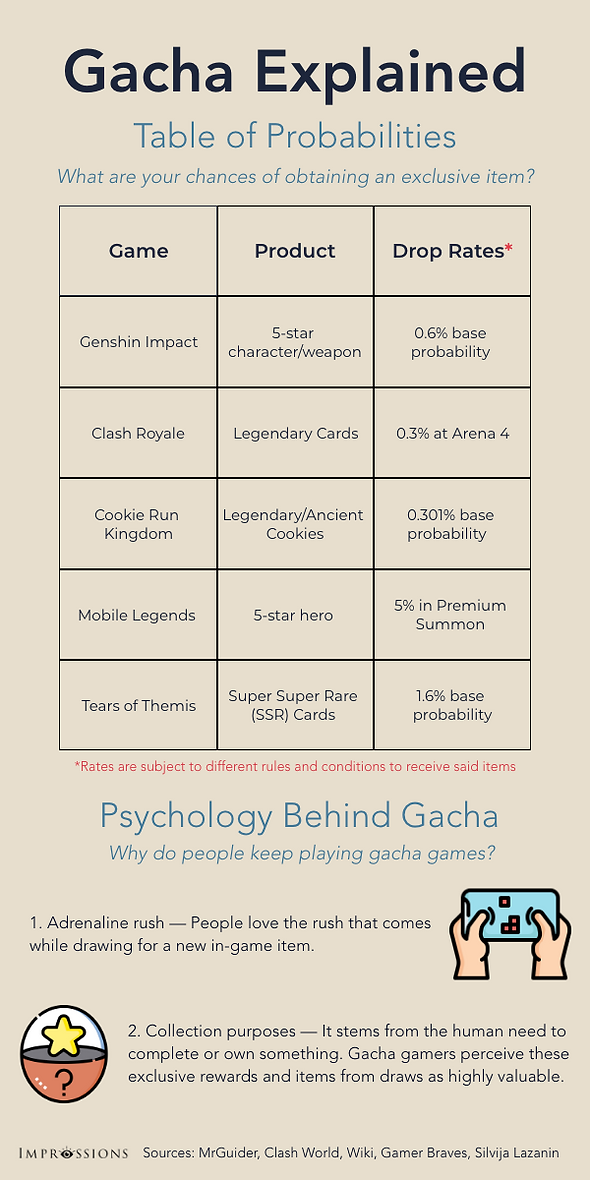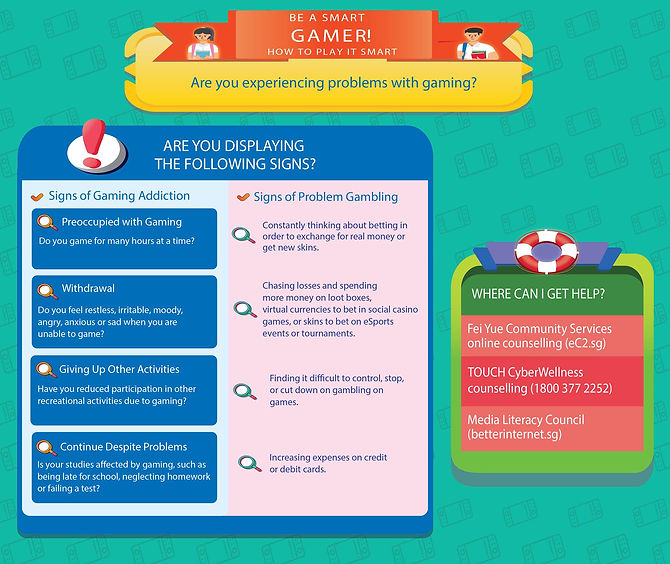3 min read
Games Gacha Money: How Gacha lures youth to become gamblers
Loot boxes and gacha systems are common in today’s games, increasing youth’s exposure to gambling.
BY: KAMAL SAWLANI, MARISSA ARIELLA and GILLIANA CARDENAS PALMA
“These games mean a lot to me, so much that I’m willing to spend money on them. And if it just shuts down, it would break my heart,” says Aria, an 18-year-old gacha gamer.
Gacha games, inspired by Japan’s gachapon randomised capsule machines, are free-to-play. They include in-game paid currencies to raffle for desired items. There’s no guarantee of winning, parallel to gambling.

Genshin Impact uses Genesis Crystals as it’s in-game currency, which is only attainable through spending real money. Players who purchase these packages for the first time also receive a bonus.
PHOTO: GILLIANA CARDENAS PALMA
One example is Genshin Impact, which topped charts globally just a month after its release in 2020. It earned $2.1 billion within its first year, which attributed to gamers like Aria spending on its gacha system until they get their special character or skin. Aria estimates she’s spent $1,100 on gacha-like games, particularly in Genshin Impact.

Character Event Wish banners are a core feature in Genshin Impact, where players spend another in-game currency, primogems, to draw limited-time characters. Primogems are obtained through playing the game or converting Genesis Crystals. PHOTO: GILLIANA CARDENAS PALMA
Gacha elements like loot boxes, which are mystery chests with potentially rare items, are becoming more popular as game studios maximise profitability. They’re now found within 59% of iOS games and 71% of Steam’s desktop library, significantly increasing youth exposure.
Ms Neo Hui Juan, a spokesperson from the National Council on Problem Gambling (NCPG), says, “Loot boxes are a game of chance, and given the ease of cashless transactions these days, youths may end up overspending if they’re unaware of their spending habits.”
“Being more prone to risk-taking, youths may be tempted to purchase more loot boxes in order to obtain rare items or 'skins',” says Ms Neo. This causes youths to develop a gambling addiction. Several European countries have banned loot boxes because of this link.

It’s not uncommon to spend large sums of money, given the psychology and low probabilities behind gacha games giving you your desired reward. INFOGRAPHIC: GILLIANA CARDENAS PALMA
“While I understand gacha in games does count as a form of gambling, it doesn't really stop me from spending that much anyway. I’m doing it within my own means, so it wouldn't affect anyone but me,” says Aria. She works part-time to fund her purchases.
However, Aria’s spending habits take a toll on her friendships as she struggles to find a balance.
She says, “It makes me unable to spend as much time as I would like with my friends. I tend to make plans to go to expensive places to eat all the time, but end up not having enough money because I spent it all on games.”
Other gamers like Yew Chin Siang, 18, had an eye-opening experience. “I didn’t understand how much I had spent on loot boxes until one of my games, Vainglory, essentially shut down,” he says.
Vainglory’s publisher pulled the plug in April 2020, citing high costs and COVID-19. However, developers supported a community edition of Vainglory, but disabled in-game purchases and multiplayer features. Special characters and skins Mr Yew previously raffled for became free for everyone.
Mr Yew spent over $200 on Vainglory’s loot boxes, making up most of his gaming spend. The experience made him realise that overspending on virtual goods wasn’t beneficial for him. However, he’s kept a positive mindset.
“Although Vainglory has died down, the money I spent on it can be attributed to the thousands of hours I had fun playing it,” Mr Yew says.
Consequently, Mr Yew stops spending after obtaining desired in-game resources. “I’m more cautious with my money as I know it’s not easily earned, and should be prioritised for greater necessities, which games are secondary to,” he says.
Effective preventive measures against gambling addiction include developing a healthy, mature mindset towards gambling, through evaluating the consequences of taking risks. Setting a budget for gambling prevents the addiction from spiralling out of control, while focusing on meaningful activities can reduce gambling temptations.
“[For] the past 3 months I've been struggling for money to keep up my expenses. But then again, I have a simple mindset of just doing whatever I like and thinking about it later because it makes me happy, so while I do regret it, I don't really regret it as much as I should,” Aria says.
People in Aria’s situation may not prioritise limiting their gacha game expenditure, even though disposable income restrictions are important for securing future finances.
The National Addictions Management Service said the effects of gambling on a person’s brain is similar to drug or alcohol addiction. Only they can break the cycle. Health Hub suggests that gambling addicts should confide their struggles in someone trustworthy, or consult a professional.

The infographic above lists some warning signs of gaming addiction and problem gambling in youths to look out for. Please contact the aforementioned organisations if you suspect that you or someone you know exhibits these signs. INFOGRAPHIC: COURTESY OF MS NEO HUI JUAN/NCPG
